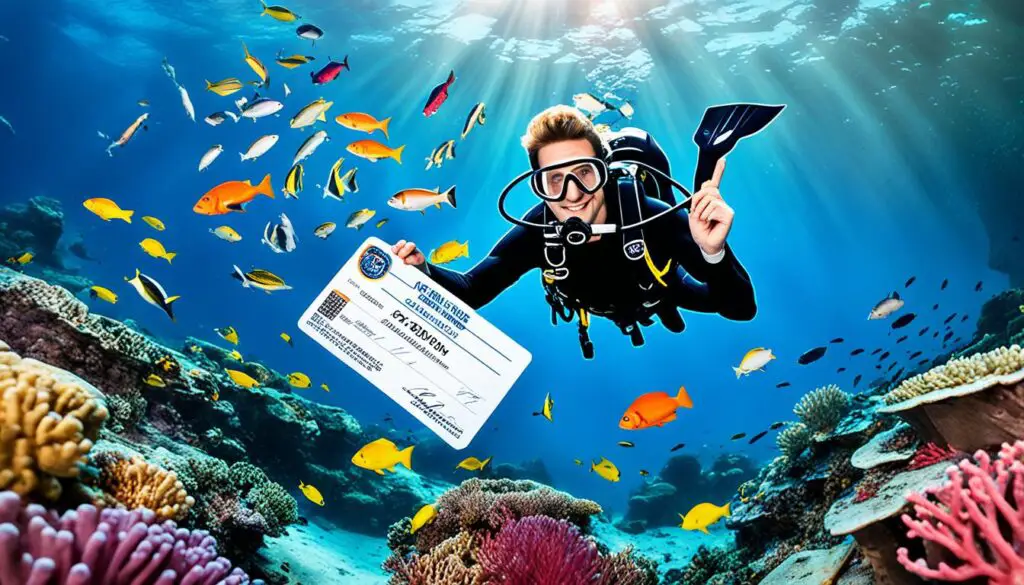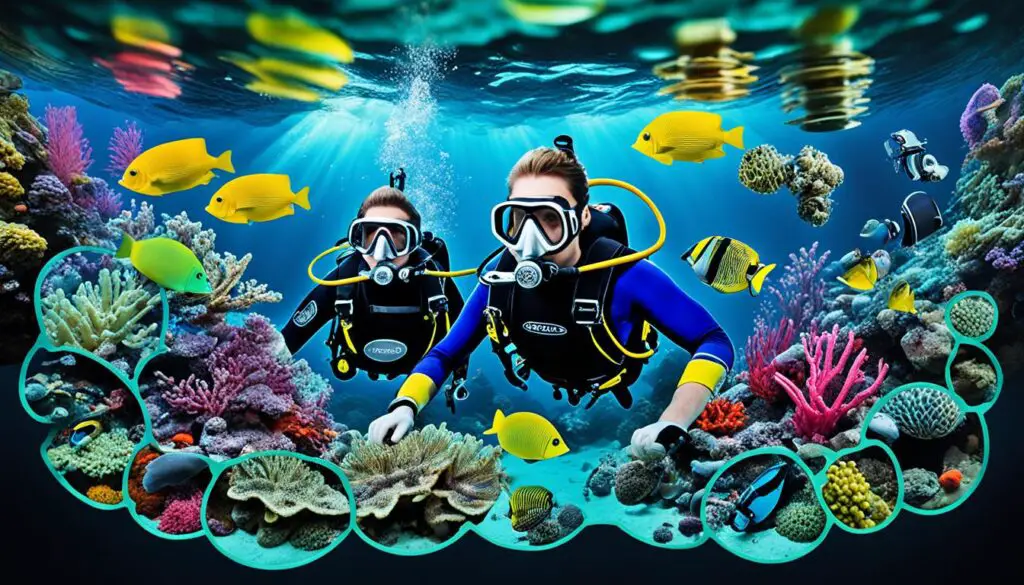To explore the underwater world with confidence, you need dive certifications. This involves workshops and training. We’ll guide you through becoming a certified scuba diver step by step.
Key Takeaways:
- Dive certifications are essential for exploring the underwater world with confidence.
- Workshops and training programs offer the necessary knowledge and skills for scuba diving certification.
- Getting certified as a scuba diver involves completing knowledge development, confined water dives, and open water dives.
- One of the most recognized certifications is the PADI certification.
- Before enrolling in a certification course, ensure you have basic swimming skills and are physically fit.
The Process of Getting Certified
Getting a scuba diving certification has three main parts. First, you learn the basics. Then, you practice in pools. Finally, you go diving in the open water. The PADI certification is one of the best-known certifications for this sport.
To earn your certification, take the PADI Open Water Diver course. This class teaches you everything needed. It includes learning, practicing in pools, and diving in the ocean or lakes.
The course usually lasts three to four days. The time it takes depends on you and the dive center’s schedule. You’ll learn a lot and become ready to dive safely.
After getting certified, you can rent diving equipment. This opens up a whole new world for you. You can explore the ocean’s deeps or beautiful lakes. It’s a chance to see amazing marine life up close.

Requirements and Preparation
Before taking up a scuba diving course, there are important things to know and do. Let’s look at what you need to consider:
Swimming Skills
Being able to swim is vital for scuba diving. You don’t have to be super fast, but you should feel at home in the water. It’s also important to be able to float for a while. This makes sure you’re safe and feel confident while diving.
Physical Fitness
Scuba diving is not for the unfit; it can be tough on the body. Good health with strong muscles and a healthy heart makes diving easier and safer. Regular workouts and a healthy life help you meet the diving challenges.
Scuba Gear
Having your own scuba gear is a big plus. At the least, you’ll need a mask, snorkel, and fins. These must be the right fit and safe. While some gear like breathe regulators might be provided, having your own ensures you are used to it and it fits you well.
Before diving, you might have to fill out a health form. This checks if you’re fit for diving. If you have any health worries, see a doctor to make sure diving is safe for you.
By ticking off these steps, you’ll get ready to explore the underwater wonders with ease.

| Swimming Skills | Physical Fitness | Scuba Gear |
|---|---|---|
| Basic swimming skills | Good overall health | Mask, snorkel, and fins |
| Comfort in water | Cardiovascular fitness | Regulators, buoyancy control devices, dive computers (may be provided) |
| Muscular strength |
Conclusion
Getting your scuba diving certification lets you dive into a world full of excitement and adventure. Dive workshops and training teach you how to dive safely and confidently. You can start with the PADI Open Water Diver course or try more advanced diving techniques. The learning never stops for divers.
With a scuba diving certification, you’re ready to explore the ocean’s beauty. You can visit colorful coral reefs or see sunken ships. Every dive introduces you to a world full of life and amazing sights.
So, why wait? Get your certification and discover the wonders beneath the waves. Your certification will bring you unforgettable experiences. It’s a journey that will fill you with the magic of the sea, all while being safe and well-prepared.
FAQ
What is a scuba diving certification?
A scuba diving certification is a key that opens the underwater world. It makes diving safe and fun. You get it through classes and practice in the water.
How do I get certified as a scuba diver?
To become certified, sign up for a course like the PADI Open Water Diver. You’ll learn the basics, practice in a pool, and then dive in the sea.
How long does it take to complete a scuba diving certification course?
Such a course can be finished in three to four days. But, this might change based on how you learn and where you do the course.
What are the requirements to enroll in a scuba diving certification course?
First, you should be a good swimmer and in good shape. You must also fill out a health form. If you have health worries, check with a doctor.
Do I need to have my own scuba gear to get certified?
Yes, you need a mask, a snorkel, and fins. But, the dive center can often loan or rent you the rest of the gear.
What can I do with a scuba diving certification?
Having a certification means you can rent equipment and dive anywhere safely. It invites you to see and experience the beauty of our oceans like never before.
Can I continue learning and improving as a diver after getting certified?
Yes, the journey doesn’t end with your first certificate. There’s a whole range of advanced courses and special dives to dive into.
Why should I get certified as a scuba diver?
Getting certified lets you dive with freedom and joy. It’s a ticket to a world under the waves, waiting for your exploration.
